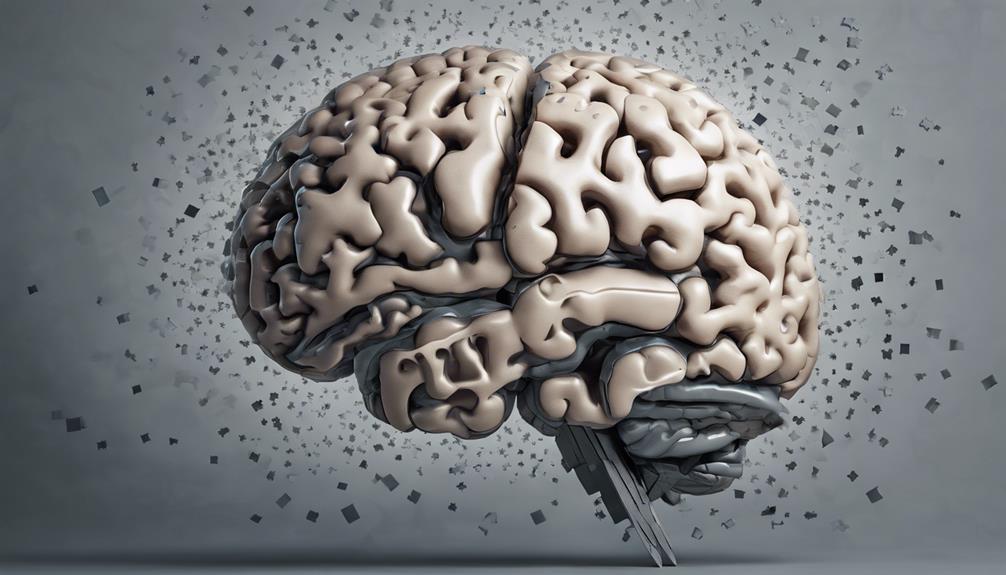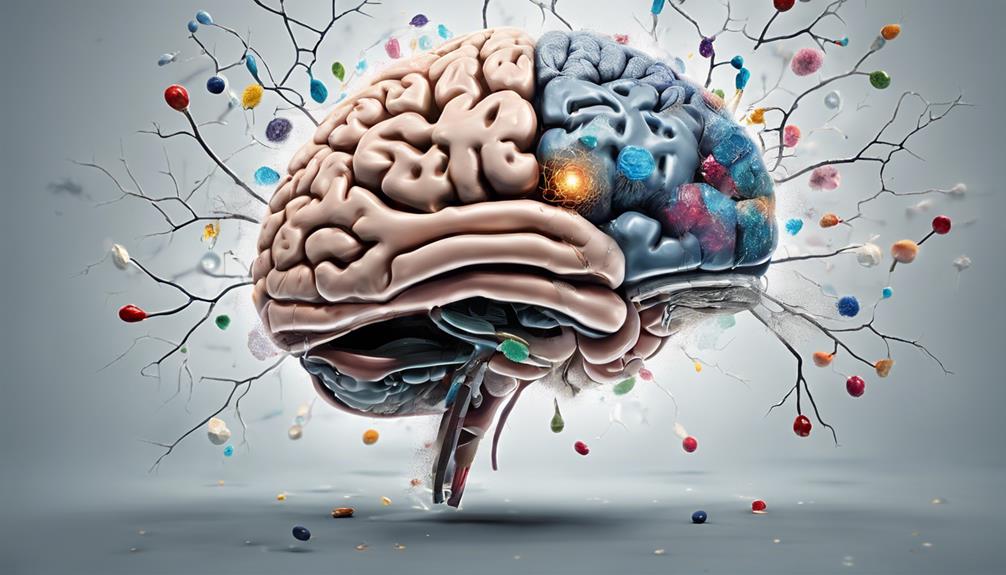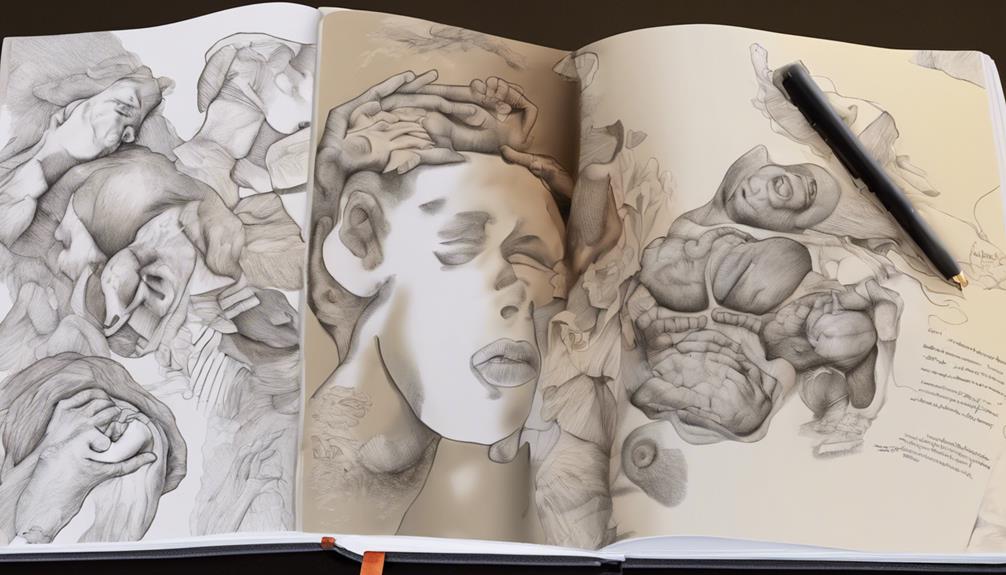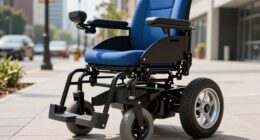Concussions can cause memory loss through various ways like brain cell impact and chemical changes. They affect memory, attention, and information processing. Tests and brain imaging can help diagnose memory issues. Treatment involves therapies, medications, and counseling. Memory training, goal-setting, and task prioritization aid in recovery. Multiple concussions can lead to persistent memory problems. Daily routines and memory aids like calendars can help cope with memory loss. Stress management techniques and proper sleep enhance memory. Seeking support and engaging in rehabilitation programs are essential. Understanding the link between concussions and memory loss is important for recovery and brain health.
Key Takeaways
- Concussions can lead to memory loss due to brain cell impact and chemical changes.
- Cognitive functions like memory, attention, and information processing are affected post-concussion.
- Multiple concussions increase the risk of persistent memory loss and long-term impacts on brain function.
- Cognitive rehabilitation programs and memory training can significantly improve memory function after a concussion.
- Stress management techniques, like mindfulness and proper sleep, are crucial for enhancing memory post-concussion.
Causes of Memory Loss After Concussion
Memory loss after a concussion can be caused by various factors such as brain cell impact, disruptions in neurotransmitters, brain swelling, bleeding, or chemical changes. When a concussion occurs, the brain cells can be affected, leading to memory problems. Additionally, disruptions in neurotransmitters, which are the brain's chemical messengers, can further contribute to memory loss. Brain swelling and bleeding resulting from the injury can also impact memory function. Additionally, chemical changes within the brain post-concussion can interfere with the processes responsible for memory formation and recall.
To diagnose memory loss after a concussion, healthcare providers may conduct neurological exams, cognitive tests, and imaging scans like CT and MRI. They'll also review the individual's medical history and assess their symptoms to determine the extent of memory impairment.
Treatment approaches for memory loss post-concussion often involve rest, cognitive therapy, medications targeting specific symptoms, physical therapy, and psychological counseling. These methods aim to support the brain's healing process and promote the recovery of memory functions after a concussion.
Impact on Cognitive Function

Concussions can profoundly impact cognitive function, influencing memory retention, attention span, and information processing abilities. When dealing with cognitive impairments after a concussion, it's important to understand the potential challenges that may arise.
- Memory Loss: Concussions can lead to memory loss, affecting the ability to learn new information, recall recent events, and retain details of conversations.
- Attention Deficits: Individuals may experience difficulties in sustaining attention, staying focused on tasks, and avoiding distractions.
- Information Processing: After a concussion, processing information efficiently may become challenging, impacting problem-solving, decision-making, and multitasking abilities.
- Severity and Individual Factors: The impact of concussions on cognitive function can vary depending on the severity of the injury, age, health status, and history of head trauma.
Understanding these aspects is critical in addressing cognitive impairments post-concussion. Cognitive rehabilitation programs can play a significant role in improving memory loss and cognitive deficits, ultimately enhancing overall brain function and quality of life. These programs typically involve a combination of therapeutic interventions, exercises, and adaptive strategies designed to support cognitive recovery. Mild cognitive impairment explained through these approaches emphasizes the importance of early detection and targeted treatment to prevent further cognitive decline. With consistent efforts, individuals can regain a significant portion of lost cognitive abilities and improve their day-to-day functioning. In addition, addressing early signs and seeking appropriate interventions can halt or slow down the progression of cognitive difficulties. It is crucial for caregivers and healthcare providers to recognize **what is mild cognitive impairment** and take proactive measures to manage it effectively. Through continued support and tailored rehabilitation, individuals may experience substantial improvements in cognitive health and overall well-being.
Diagnosis and Assessment Methods
When diagnosing memory loss after a concussion, doctors use memory tests and brain imaging techniques. These methods help assess the impact of the injury on cognitive function and determine the extent of brain damage.
Understanding these assessments is essential for guiding treatment strategies and promoting recovery.
Memory Tests for Diagnosis
During evaluations for concussions, healthcare professionals utilize various memory tests to assess different aspects of cognitive function. These assessments are vital in understanding the impact of the injury on memory processing and retention. Here are some key memory tests used for diagnosing concussions:
- Immediate recall tests evaluate the ability to remember information right after it's presented.
- Short-term memory assessments focus on retaining information for a brief period.
- Long-term memory tests assess the capacity to remember information over a more extended period.
- Recognition tasks measure the ability to identify previously encountered information.
Brain Imaging Techniques
Utilizing advanced brain imaging techniques plays a pivotal role in diagnosing and evaluating structural and functional changes in the brain following a concussion. CT scans and MRIs help identify structural brain damage, while diffusion tensor imaging (DTI) assesses white matter integrity and connectivity changes.
Functional MRI (fMRI) detects changes in blood flow, aiding in understanding cognitive impairments. Positron emission tomography (PET) scans reveal metabolic changes linked to memory loss after a concussion. Additionally, advanced methods like single-photon emission computed tomography (SPECT) scans offer insights into cerebral blood flow abnormalities associated with memory deficits post-concussion.
These imaging tools provide healthcare professionals with valuable information to tailor treatment plans and monitor the recovery progress of individuals who've experienced concussions.
Treatment Approaches for Memory Loss

Effective treatment approaches for memory loss following a concussion typically involve cognitive therapy, physical therapy, medications, and psychological counseling.
- Cognitive Therapy: This type of therapy focuses on improving memory function by addressing specific cognitive processes impacted by the concussion. Through various exercises and techniques, individuals can enhance their memory recall and cognitive abilities.
- Physical Therapy: Physical therapy plays an essential role in aiding overall recovery post-concussion. It can help individuals regain strength, coordination, and balance, which are vital for daily activities and cognitive functioning.
- Medications: Some medications may be prescribed to manage symptoms like headaches or sleep disturbances that can contribute to memory issues. It's important to follow the healthcare provider's guidance regarding medication usage.
- Psychological Counseling: Counseling sessions can provide emotional support and coping strategies for individuals experiencing memory loss. These sessions can help manage stress, anxiety, and other psychological factors that may impact memory function.
Cognitive Rehabilitation Strategies

Let's explore the cognitive rehabilitation strategies that can help improve memory, attention, and executive function after a concussion.
These techniques include memory training exercises and executive function tasks tailored to address specific cognitive challenges caused by the injury.
Memory Training Techniques
Memory training techniques for individuals recovering from concussions involve specific strategies aimed at enhancing memory function through attention, encoding, storage, and retrieval processes in the brain.
Here are some key techniques used in cognitive rehabilitation for memory training:
- Memory exercises to practice recalling information.
- Mental imagery techniques to visualize and aid memory retention.
- Mnemonic devices like acronyms or visualization to enhance memory.
- Consistent practice to strengthen neural connections and improve cognitive abilities over time.
Executive Function Exercises
Enhancing cognitive rehabilitation post-concussion, executive function exercises target memory, attention, and problem-solving skills to improve overall cognitive function. These exercises help individuals recover from concussions by enhancing memory, decision-making, and cognitive abilities affected by memory loss. Examples of executive function exercises include goal-setting, task prioritization, working memory tasks, and cognitive flexibility exercises. Engaging in these exercises regularly can aid in regaining cognitive abilities post-concussion. Below is a table illustrating some common executive function exercises:
| Executive Function Exercises | Benefits |
|---|---|
| Goal-setting | Enhances focus and motivation |
| Task prioritization | Improves time management skills |
| Working memory tasks | Boosts memory retention |
| Cognitive flexibility exercises | Enhances problem-solving abilities |
| Planning and organizing tasks | Improves decision-making skills |
Long-Term Effects on Memory

Experiencing multiple concussions can greatly increase our risk of developing long-term memory issues. This means that if we've had more than one concussion, we're more likely to face ongoing challenges with our memory.
Here are some important points to keep in mind regarding the long-term effects on memory:
- Up to 30% of individuals who've had concussions may experience persistent memory loss symptoms.
- Having multiple concussions raises the chances of enduring lasting impacts on memory function.
- Post-concussion syndrome can cause recurring short-term memory loss over extended periods, spanning weeks, months, or even years.
- Long-term memory loss resulting from concussions can have enduring consequences on overall brain function.
Coping Mechanisms and Support Systems

After facing the long-term effects of memory loss due to multiple concussions, it becomes essential to implement coping mechanisms and establish support systems to navigate the challenges ahead. Daily routines play a pivotal role in managing memory issues post-concussion. Using memory aids such as calendars and alarms can help individuals stay organized and remember important tasks. Additionally, seeking support from family, friends, and healthcare professionals can provide both emotional support and practical assistance in dealing with memory challenges.
Engaging in cognitive rehabilitation programs and memory training can greatly improve memory function and cognitive abilities following a concussion. Joining support groups or online communities for individuals with memory loss can offer a sense of belonging and shared experiences, fostering a supportive environment for coping with post-concussion memory difficulties. Stress management techniques like mindfulness, relaxation exercises, and ensuring proper sleep hygiene are also crucial in reducing cognitive fatigue and supporting memory improvement. By incorporating these coping mechanisms and support systems, individuals can better manage the impact of memory loss post-concussion.
Frequently Asked Questions
Can a Concussion Cause Memory Problems?
Yes, a concussion can cause memory problems. It disrupts memory processes in the brain, leading to short-term difficulties or long-term memory loss. The severity varies based on the brain injury extent. Proper treatment and rehab can help improve memory.
Can Post-Concussion Syndrome Be Permanent?
Absolutely, post-concussion syndrome can sometimes linger indefinitely. It's a challenging reality for many. Seeking timely care and support is essential. We've learned that early intervention can have a substantial impact on long-term outcomes.
Can You Recover From Cte?
Yes, we can support individuals with CTE through symptom management, cognitive rehabilitation, and lifestyle adjustments to enhance daily functioning and overall well-being. While there is no cure, early intervention and supportive therapies can improve quality of life.
Can You Live a Long Life With Cte?
We can live a long life with CTE, but impacts on memory, cognition, and behavior may progress. Managing symptoms, adapting lifestyle, and seeking early interventions are crucial. Like a ship sailing through rough waters, we can steer towards a better quality of life.
Conclusion
To sum up, memory loss after a concussion can be a serious issue that affects cognitive function. It's important to seek proper diagnosis and treatment to address these challenges.
Remember, our brains are like delicate machines that need care and attention. By following medical advice and using coping mechanisms, we can help support our memory recovery.
Just like a puzzle, with patience and perseverance, we can piece together our memories and move forward.









